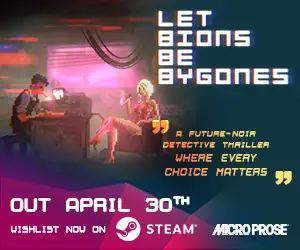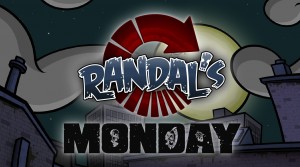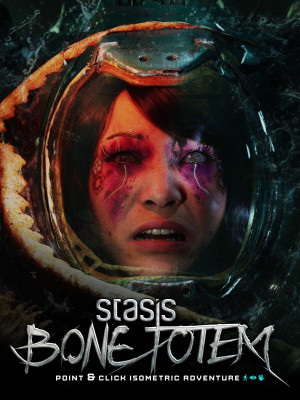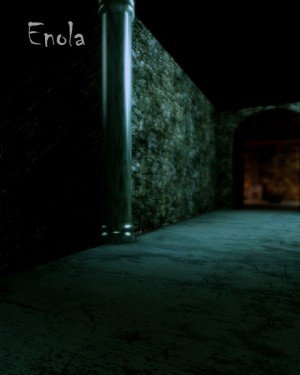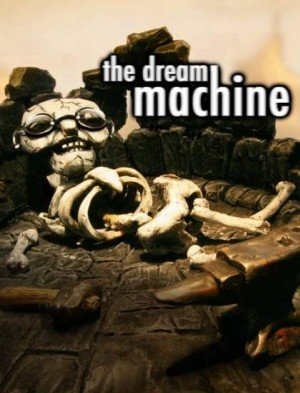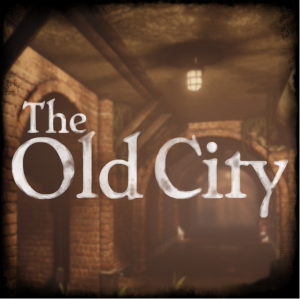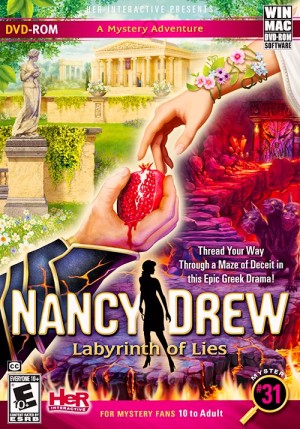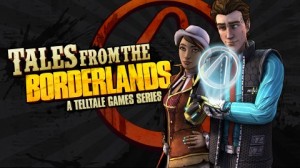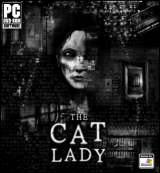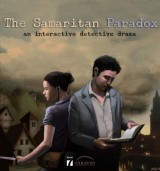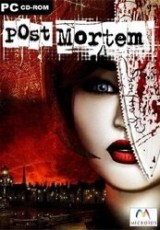Review for Randal’s Monday
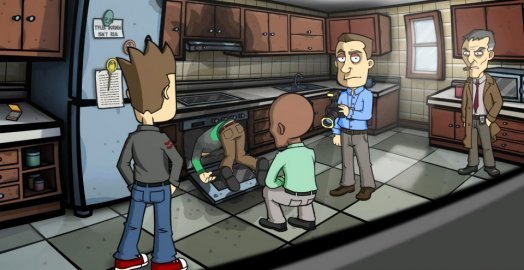
Randal Hicks is an unapologetic, unbearable cad, and his “Groundhog Day” is triggered one Sunday when he steals his best friend’s engagement ring – for the heck of it – while said friend is puking his guts out in a garbage-strewn alley behind the bar where they had spent the evening getting wasted. The next day, the titular Randal’s Monday, is the start of a most unexpected but totally deserved ordeal. By stealing what turned out to be a magical ring, Randal has changed the time-space continuum, and the agony of the loss has pushed his neurotic buddy Matt over the edge and driven him to suicide. Randal, lacking even an iota of decency, is barely perturbed by the tragedy at first, but it soon becomes clear that he is doomed to repeat the day (even as Matt annihilates himself in insanely weird ways each morning) till he returns the ring to Matt. But that is easier said than done, and it takes six Mondays spanning fifteen-odd hours of inconsistent gameplay spent in Randal’s insufferable company to reach a conclusion that is unfunny and bizarre.
Developed by Nexus Game Studios, Randal’s Monday is a sleek production. It has well-designed, neatly-drawn comic-book style screens littered with grimy locales and unpleasant characters; excellent voice acting spewing no-holds-barred profanity; smooth animation and good lip sync; and some nice touches that show the march of time though the day keeps repeating, like an unused hot dog going bad in the inventory, or the bartender appearing more attractive to Randal as he starts to like her. The game kicks off as a puerile gag-fest crammed with pop culture references, but then gets into frequent and lengthy metaphysical conversations that are a chore to endure, along with another activity that prolongs game time by hours: travelling between locations via the subway, each trip a dreary interruption. Most quests are inventory-based and swing widely between simple and unfathomable, with several too random to be solved by any stretch of logic. Standalone quests also tend towards tiresome, either forcing you to do things repeatedly or have in-depth knowledge of movies, books and such. The most interesting segment is Randal’s stint in jail, which has well-knit quests, but it is debatable whether those couple of hours are worth spending so many more in the captivity of this crass escapade.
The story is straightforward at first. Randal must return the cursed ring to Matt to keep him from killing himself, and thus break the cycle of the repeating Mondays. A mysterious hobo spouting business mantras holds the key to the mystery, but before Randal can get to him, he must first deal with an irate landlord, an overzealous cop, a disgusted boss, an amnesiac pawnshop owner, an insolent kid, a crusty detective, a geeky bookstore owner, a miserly Asian hot dog vendor, a violent crew of inmates, Matt’s bellicose fiancée Sally, Jay and Silent Bob, and the Four Horsemen of the Apocalypse. There is ample scope for comedy and quests, but instead the game deviates into the surreal, convoluting the plot and heaping on wordy chatter that distracts from the urgency of the crisis. Randal himself is the definition of obnoxious. A lackadaisical courier boy, he takes great pride in being cynical, antisocial, crude and exploitative. Most of his co-stars are equally unlikeable, and the few voices of reason around him – his landlord, his boss and detective Kramer – are not allowed to counter him effectively in their abbreviated roles. Put together, the despicable cast is likely to strain rather than entertain you.
Set in an urban sprawl of ugly buildings and dirty alleys festooned with pigeons and koalas, the game is split into six chapters, each representing a Monday. While chapter transitions are driven by Randal finishing specific tasks, there is a lot of leeway in visiting locations and doing quests, and many items may be collected and/or used on different days. At first it is very interesting to explore Randal’s world and discover the quirks of each place. But with the bulk of the game restricted to the same handful of places, the incessant – and often clueless – backtracking soon becomes arduous. Randal travels between locations like his apartment and Matt’s, the courier office, the pawnshop, a convention centre, a shrink’s office, and the bar using the subway, which requires him to visit the station in that area and board the train each time. This needless repetitive activity is truly aggravating and does nothing but artificially pad playing time. Areas where activities have been completed are blocked off, but few new areas are added as the story progresses, leading to deep monotony in the second half. There are also some jarring incongruities along the way, like when Randal is surprised by the décor of Matt's apartment, as if he has never seen it before.
Objectives are mostly related to getting past people or obstacles, or solving someone's problem. These can be basic, like helping a guy warm up hot dogs; insanely convoluted, like taking a peek at an accounts ledger in a rundown store; or sort of bloodcurdling, like splashing about in warm puke in a choked public toilet. The interface, at least, is simple point-and-click: right-clicking hotspots brings up the possible actions, such as look, take or use; left-clicking the desired action executes it. The inventory stays concealed at the base of the screen and is opened by a quick roll of the mouse wheel. Items may be combined with each other – some multiple times with various objects – or with onscreen hotspots. Item collection is very inconsistent, however. Sometimes Randal picks up objects that are used days later (or never at all), while at other times he has to return to frequently-visited places to collect things that have suddenly become functional. Usually the inventory contains about 15-20 items, mostly run-of-the-mill stuff like glue, a hammer, batteries, scotch tape, and things you have already used.
The spacebar reveals all hotspots, which is essential given the eccentric quest design which stymies you by randomly changing the rules and skimping on clues and feedback. In fact, quite a bit of the negative feedback is blatantly misleading – the first time you do something, you may be told it is of no use, but doing it repeatedly yields results! A walkthrough of sorts is accessible in-game, but it is sequential and reveals one step at a time, with each peek assassinating an imaginary cat. Given the non-linear progress and vague tasks required, despite being ultra-judicious in asking for help, I still ended up with the dubious moniker of ‘cat murderer’.
The main focus of the game is its dialogue. Conversations are well-written in the literal sense of grammar and content (though there are quite a few typos), but the effort to be quippy yet profound is painfully evident. A lame pun about 'wieners' is flogged to death, there is an inordinate number of gay jibes, Randal is called names like Susan and Alison for no reason, and the script constantly chatters about breaking the fourth wall, robbing all such actual moments of real charm. The sheer volume of discussion about pseudoscientific tripe like the meaning of life – which you dare not click quickly past as a brief sentence actually relevant to the game might be hidden within – is staggering.
There are flashes of comedic brilliance – Jay’s cameo is a riot, for example – but many occasions which could have been funny are ruined by Randal’s joyless perspective of the world around him. Surrounded by caricatures, he takes himself extremely seriously and sees people and situations only as annoyances dampening his cool quotient. As a result, his interactions are impatient and demanding, and easily escalate to genuine rudeness when he doesn’t get his way. In a comedy, it is essential for the lead to possess a lightness of spirit, a joie de vivre that takes even the mundane or irritating and turns it into a laugh with a clever comment or a snarky repartee. Randal just cribs and cribs on about how his life sucks thanks to others.
The tedium is compounded by an overkill of pop culture references force-fitted into scenes where they make little sense, like video game posters and knickknacks crowding a psychiatrist’s office, or shoved into dialogues, making them unduly lengthy. Randal lives on Threepwood Street, uses Tetris bookends, has Lucas and Jar Jar on his hit list, and at one point unlocks a case designed like a purple tentacle. Randal's employer uses a familiar game logo, ‘Trek Wars’ is the favoured sci-fi franchise, and even Whoopi Goldberg's weight is debated. Furniture, posters, fridge magnets, suicide notes, showpieces… everything pays homage to popular games, movies, TV shows, books and celebrities, and in case these fall short, we have a geek convention and a comic book store to supplement the repository of memorabilia. In-game Easter eggs are exciting because they are rare and must be discovered; crunching over them every step of the way is just messy.
The cartoony world is bright and well-drawn, but most of the high-resolution screens are terribly unappealing: messy rooms with rotting pizzas, vomit-splattered bathrooms, alleyways heaped with garbage, filthy corridors. Many areas comprise side-scrolling screens that unveil with a cool fisheye effect as Randal walks about. The characters are lifelike despite being over-the-top caricatures, with smooth movements that look natural. There are a few animated cutscenes, and some realistic in-game effects as well, like a subway office trembling each time a train passes by.
The guitar-based soundtrack, especially the theme music, is hip and catchy, but the few tracks repeated for hours forced me to lower the volume to barely audible midway through. Sound effects are functional at best: Randal wears sneakers but his steps knock like boots on wood; drinks being gulped sound more like sinks unclogging, and the beat of a demon’s wings is reminiscent of bellows boosting a fire. The loud singing of a malfunctioning robot is nerve-wracking, as is a nutcase repeatedly screaming ‘Alan!’. We also spend a minute listening to Randal pee (before, naturally, he exits the loo without washing his hands).
The expert voice acting keeps the script from sinking under its own weight. Randal is voiced by the very accomplished Jeff Anderson (best known as the protagonist’s namesake Randal Graves in the Clerks series), but Jason Mewes, reprising his iconic role as the chilled-out, foulmouthed drug dealer Jay, steals the show. The rest of the cast keeps up with the stars: you feel the exasperation of Randal's longsuffering landlord and boss; the unflappable pawnshop owner is a delight; the vile, snotty kid is perfectly aggravating, and detective Kramer, investigating Matt’s suicides, does his best to rein in the impertinent Randal. Exceptions to the quality acts are whiny Matt, his irritating fiancée Sally, and the Asian vendor, all too stereotypical to be comical. The ubiquitous expletives escalate in vulgarity as the game progresses, and often cross the line to being abusive rather than snarky.
The main problem with Randal’s Monday is that it is simply too tedious in terms of gameplay, and too bloated with excessive dialogue. It aims for irreverence but ends up being rude, and what could have been a crackling comedy with sharp editing and well-designed puzzles is reduced to a drudgery of frustrating, unintuitive quests, relentless backtracking and blah conversations. Randal refuses to evolve as a person despite the momentous events unfurling around him, and resorts even to violence to escape his quandary. The supporting cast is by and large more annoying than entertaining, and the typecasting of women as shrill, vicious shrews is done with the subtlety of a sledgehammer. The surreal conclusion hijacks the otherwise ordinary proceedings, and left me bewildered and irritated. The sleek production, smart voice acting, occasionally engaging quests, and a clever Murray-the-Talking-Skull reference are not nearly enough to compensate for the many issues dragging down the experience. Mondays are tiresome; Randal’s Monday is excruciatingly so.



